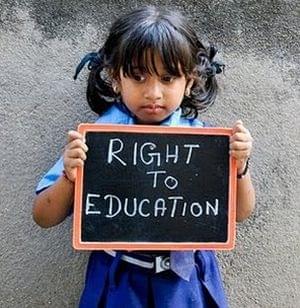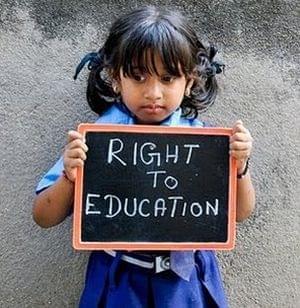Commentary
RTE: What Are We Actually Opposing?
Yash Gandhi
Apr 15, 2012, 05:47 PM | Updated Apr 29, 2016, 02:28 PM IST
Save & read from anywhere!
Bookmark stories for easy access on any device or the Swarajya app.


The Right to Education remains watershed legislation in the history of India for a variety of reasons. A product of the tokenism and populist politics the UPA is known for, the Act is also arguably the first time a major reservation policy will be executed on economic lines (conflicting opinions exists on whether economic criterion will be sole criterion) . Since ‘meritocrats’ of the world have always sought reservation of economic grounds over caste, this would have ideally been a policy they should have embraced without any hesitation. But, that has clearly not case. Infact the debates on the Right to Education has led to (if I may say) a state of confusion among the Indian Right, which is sadly struggling to come up with a strong, uniform critique of the legislation. Perhaps it is also possible that we have not completely understood who the prime drivers behind this act were and the intended beneficiaries are.
Historically, the Right has been quite ambivalent (at max flexible) about reservations. Even at the peak of Mandal, the stand of the Right remained extremely guarded. At that time, the clamor for reservation of economic lines reached a high point. This could also be linked to the arrival of a solid middle class that simply couldn’t connect with Mandal politics.
With the RTE entering the arena, we seem to find ourselves slightly confused on what we are opposing and why not to forget our inability to oppose the right people. Apart from the fact that such legislation will take a very heavy toll on our coffers, I don’t see much reason as to why our critique of such legislation will succeed. Again, I repeat this is because we have failed to understand the interest groups that are driving acts such as this.
Let me now turn to my main argument. It stems out our inability to understand that the Right to Education, in addition to classic UPA tokenism also marks the return of the voice of the Indian public school ‘babalog’, who are thriving in the current UPA regime. It is no coincidence that those leading the charge on RTE were not Christian Missionaries but the Indian Public School Society, a body of some of India’s finest public schools including the Doon School, Mayo Boys, both the Lawrence Schools, Welham Girls to name a few. It is also no coincidence that those who are framing laws in this country today have either schooled in some of the top public schools and top Colleges of India but, these are the same institutions that will not come under RTE (and to extend it to higher education under the purview of the OBC judgment). Thus, is it not a classic example of ‘preach from the pulpit syndrome’? It is fair to talk about social justice as long as my alma mater preserves it elite character and stays out of it!
It is equally our fault that we are trying to delve into social aspects of what will essentially be an economic execution. I am vehemently opposed to the manner in which Mr. Sibal and his colleagues have simply used the minority card to deflect attention from the larger issues at hand. They know fully well that anything with the ‘M’ word ensures all other issues are erased and our response to the judgment is only proving them right.
My question is, how many middle class or upper middle class Muslim families are sending their children to minority schools? Or what gain will minority institutions have in excluding a large chunk of economically deprived Hindu students? As a matter of fact does this bill not snatch away a core ‘client base’ from them? Thus, I seek to argue that the clause of unaided minority institutions remains an eyewash to safeguarding larger and more well oiled lobbies.
Our response also runs the risk of showing us in very poor light, that we are a class of elitist snooty individuals who oppose any form of social justice when it is ironically not the case. From opposing reservation of caste to seeking a partial reservation on economic situation, we now seem to have moved to ‘no reservation’ at any cost, which at any given point is totally impractical. This is that time when the original ‘meritocrats’ have turned that back on their original conceptions of social justice.
Thus, the question naturally arises as to what is the solution? The sense I got from various responses I read suggest that we need to focus more on quality schools than anything else. But, this approach has its own set of problems. One of the possible solutions I came across is allowing FDI in primary education and setting up Etons in India. But are we so naïve to believe that the elite public schools of our country will allow other Etons to come up? I can say it absolutely confidently that it is not minority groups but supra elitist public schools that will oppose any such move. In any case, has anybody bothered to understand the kind of fees these Etons will charge?
If one thinks having so called educational regulators will ease the mess then I suppose that is an incorrect observation. On one hand we seem to talk of removing ourselves from the clutches of government while on the other hand we call for regulatory bodies. I fail to see much of a connect here.
The point of this hurriedly written piece is both to express my confusion on how to crack the puzzle and to ask ourselves whether we are doing the right thing in opposing this in the current form. Do we not run a huge risk or adversely redefining social justice? In spewing harsh critiques on minority institutions are we letting the real benefactors away very easily? Is it not better if we focus base our arguments on the economic aspects of what is an economic legislation? Kanchan Gupta hits the nail on the head with his Tweet, “Debate on RTE should focus on funding. SC or no SC, RTE is doomed because no Govt has a cowrie to fund its implementation. Rest immaterial.” As a matter of fact, NDA governments have been a lot better in implementing Central schemes than Congress ones. Thus, why not wait for a solid governance driven response rather than a stand driven more by impulse?
Thus, in conclusion, all I wish to say is that education is something that’s fundamental to national progress. And I do not personally believe the job only rests on the Government to provide quality education. Private, minority and elitist players need to realize the duty they have towards this and only when that happens we can move ahead. Otherwise, it’s the same old debate, the same old Tweets and the net result remains a golden zero.
(The point of this article is to express my own confusion on the issue and perhaps my own apprehensions about where things are going due to what I see as a weak response from sections of the Indian Right towards RTE)





